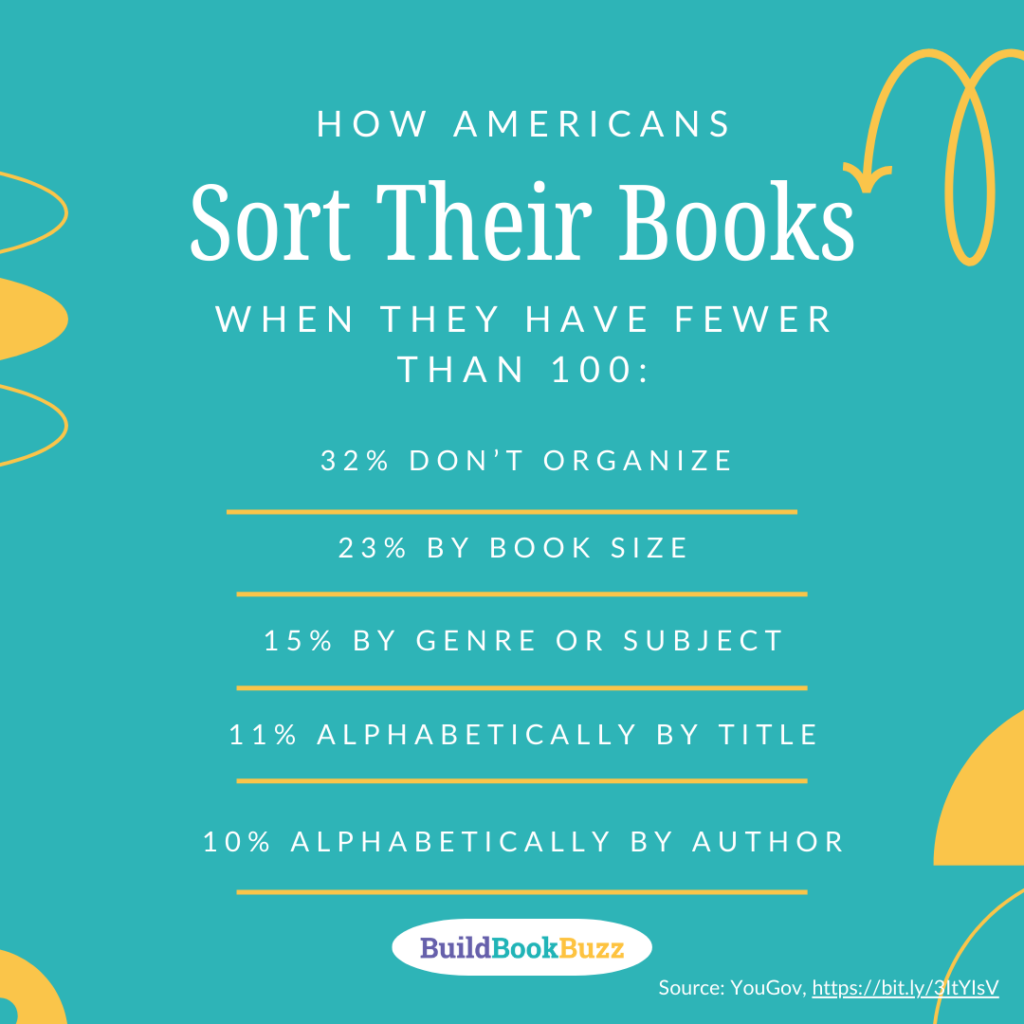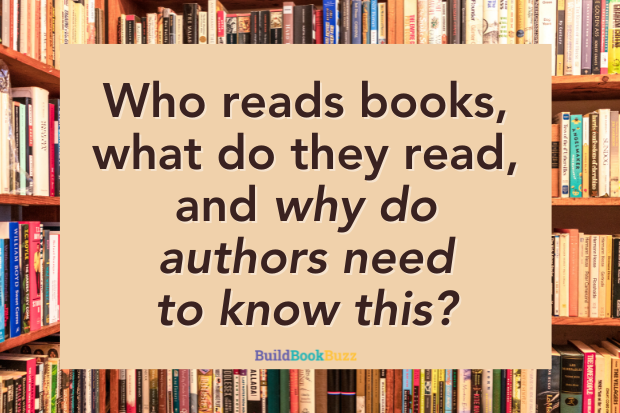Who reads books, what do they read, and why do authors need to know this?
The more you know about who reads books and what they read, the less time you'll waste with book marketing and promotion.
Who reads books?
We’d like to think it’s “everybody,” just like we want to believe the target audience for our books is “everybody.”
Neither is true. That’s why none of us should be marketing to “everybody.” Instead, you want to market to people who read books, and read books in your genre or category.
This article is designed to give you some of that information.
What follows is a more-than-shallow, but not-exactly-the-deepest dive into who reads books and what they read followed by a few insights from the data that you can use as you write and market your books.
Who reads books?
Who reads books? Who doesn’t read books?
Turns out that the more education and money you have, the more likely you are to be a book reader. Here are the specifics. I’ve added links to the original source of each statistic where you’ll find more information.
General
- A little more than half of all Americans said they read at least one book last year, but most – 82% – read 10 or fewer. (source)
- The percentage of urban adults who said they’ve read a book in the previous 12 months increased by 6% from 2019 to 2022. (source)
Education level
- Individuals with postgraduate degrees own the most books. (source)
- 73% of Americans with a college degree said they read at least one book in 2023 while less than half, 44%, of those without a college degree did. (source)
Gender
- American women are more likely than men to have read a book in the past year. (source) This is the case globally, too. (source)
- At 51.4%, slightly more men than women reported being non-readers. (source)
Age
- People 65 and older had the fewest non-readers at 41.4%, while those 45 to 54 had the highest number of non-readers, 60.9%. (source)
- 19% of Americans between 31 and 35 own at least 100 physical books, compared to 31% of those between 51 and 55, and 42% of those between 71 and 75. (source)
- 24% of middle-grade books sold are comics and graphic novels, but that drops to 16% when Dav Pilkey’s Dog Man books aren’t included. (source)
Income
- There’s a correlation between reading and income level. Adults living in households earning less than $30,000 annually are less likely than those whose annual household income is $75,000 or more a year to read books. Almost one-third – 31% – of those in the lower income bracket aren’t book readers compared to 15% at the noted higher income level. (source)
- 15% Americans of who earn less than 75% of the median national income (currently $74,580) own no books and 16% own at least 100. On the flip side, just 4% of Americans who earn at least 200% of the median national income own no books and 40% own at least 100. (source)

What do they read?
Let’s look at the formats people read – print (hardcover and paperback), e-book, and audio – and some of the genres.
Format
- Print books are read the most at 34.4%, followed by e-books at 14% and audiobooks at 10.7%. (source)
- In early 2021, 65% of adults said they have read a print book in the past year. (source)
- Just 9% of Americans read only e-books and audiobooks. 33% of those reading digital formats for reading also read print books, while 32% only read print books. (23% read no books.)(source)
- More than 40% of Americans read a print book in 2023, while 21% read an e-book and 19% listened to an audiobook. (source)
- At 45%, older Americans (65+) read print books more than other age groups do. (source)
- Women are slightly more likely to read print books than men – 38.7% to 32%. (source)
- Women are more likely than men to read e-books – 17.1% to 13.6%. (source)
- Americans who read digital books consumed more books in 2023 than those who don’t. For example, those who do so were more likely to say they read or listened to more than 20 books in 2023. (source)
- Between 2018 and 2022, revenue from all book formats declined with the exception of audiobooks, which increased by 71.7%. (source)
- More than half of audiobook listeners – 57% – are 18 to 44. (source)
- Children listen to audiobooks. Of audiobook listeners with children, 56% say their kids listen to them, too. (source)
- Audiobooks for children grew 41% in 2022, giving that category the highest growth, but they’re only 3% of the market. (source)
Genre
- Romance is hot, hot, hot. Sales of romance books increased 52% in the 12 months preceding May 2023, with much of the growth coming from new and younger readers discovering the category on TikTok and through book-to-streaming projects. (source)
- At 55%, mysteries and thrillers are the most popular audiobook genres, followed by science fiction and fantasy at 48%. Following that are biography and memoir, romance and drama, self-development, and business and personal finance. (source)
- Mysteries and histories were the most popular genres in 2023. More than 35% of those who have read a book that year said they’ve read at least one book in both of those genres. (source)
- 45% of female readers read at least one crime novel or mystery in 2023. That compares to 28% of male readers. (source)
- In 2023, 49% of men read at least one history book, compared to 24% of women readers. (source)
- Mysteries were the fourth most popular genre for men in 2023; history books were the sixth most popular for women. (source)
- Globally, sales of travel books were up in 2023 while comic book sales were down. (source)
Why do authors need to know this?
The more you know about the people who will buy your book, the more likely you are to get your messages in front of them.
When you really know your target audience, you’ll know:
- Which social networks they use
- How they get information – radio? Podcasts? Online news sites? Daily newspaper?
- How they decide what books to read
- Whether they prefer printed books, e-books, or audiobooks
Your understanding of who is most likely to buy your book will guide your marketing messaging and where you need to show up online.
With that in mind, what did you learn from the information outlined in the data above?
Want to learn how to figure out and find your book’s ideal readers? My short video training, “Who Will Buy Your Book? How to Figure Out and Find Your Target Audience,” walks you through the process and provides the tools you need. Learn more here.
Data reveals information authors can use
Here are a few of my takeaways from the research summarized above that might help you.
- If you want to sell more books, don’t limit yourself to publishing e-books only, as so many authors do. Readers still like printed books, and audiobooks continue to grow in popularity.
- If you’re the type of author who likes to write to market demands versus those who have a specific story they need to tell, write romance novels for younger women.
- Well-educated, wealthy people are a more lucrative market than older people at a low-income level.
- Children’s book authors have the potential to stand out among parents who buy audiobooks for their children, as the category is growing, but the selection is still small.
And this is just a start.
This information, combined with your own research into what makes people decide to buy a specific book (spoiler alert: Recommendations from people they trust tops the list), can help you make important decisions about your book’s format and how you’ll market it.
So dig in. Think about it. Then act.
What did you learn from this data? How will you use it? Please share one “aha!” with us in a comment.
Like what you’re reading? Get it delivered to your inbox every week by subscribing to the free Build Book Buzz newsletter. You’ll also get my free “Top 5 Free Book Promotion Resources” cheat sheet immediately!


Thanks. Great article, And will really help target readers for advertising to build email lists
I’m glad it’s helpful, Benedick!
Sandy
This proves what I’ve known for years: the more education one has, the more literate they are. It only makes sense and shouldn’t surprise anyone. I once told a group of work colleagues that I knew a great deal about certain subjects because I read more than the Bible and the TV guide. That didn’t sit well with them, but they couldn’t deny it either. Regardless, that’s why I get angry every time any state legislature cuts their education budget. It’s a notable problem in my native Texas. Education and literacy are too important to take flippantly.
Alejandro, yes, the research lines up well with common sense. On the other hand, once a year, I take my car to a local service station for an inspection and talk books with the non-college educated woman who runs the cash register. When she’s not dealing with customers at work, she reads a book. (Great job, right??) I love it!
Cutting the education budget seems to be a problem everywhere, doesn’t it? What’s less universal — and incredibly distressing — is book banning in schools and communities. The IGNORANCE and ARROGANCE behind all of this is making me crazy.
Thanks for weighing in. I am the choir you’re preaching to!
Sandy
Just what I needed to read as I come to the end of writing my book! I thought I was just writing for laypeople who needed health advice but now I realise I can extend my audience to people who work in the health industry, effectively doubling my readership. Thank you so much!
I’m so glad it helped you, Magdalena!
Sandy